Peace and Nonviolence

My city of Chicago, known as the City with Big Shoulders, is now on its knees. But it’s not prostrate in some humble submission to God. No. Instead Chicago is weeping from the emotional exhaustion of having to bury too many youth who have been murdered.
Last year Chicago recorded 2,400 shootings and more than 505 murders, of which more than 108 were teenagers of color from seven violent communities. Already 2013, with less than two months into its birth, has seen 49 murders. Those of us on the ground seeking to bring change to this pandemic of violence know that if the Chicago cold winters are this violent, then the hot summers will not cool off. On top of the hard and constant news about those who are killing and being killed, Chicago Police stats show that only 34 percent of the murders get solved within one year. If the detectives have two years on a case, then the rate barely reaches 50 percent. The national average of murders solved is 64 percent. New York’s rate is only 60 percent. In Chicago, though, one has a 50-50 chance of getting away with a murder.
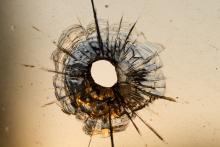
Death doesn’t make sense — especially when it interrupts the life of one so young. Richard Twiss was only 58 years old.
It makes me think: Richard was one life, cut short by a heart attack. What about all the images of God erased from our lives and families every year through gun violence in the U.S.? What about their families and pastors and youth groups who held vigils in waiting rooms across the country? What about the estimated 1,793 gun deaths since the Newtown massacre? How valuable are their lives?

Edmund Burke once said, "all that is necessary for the triumph of evil is that good men do nothing." So what is at the heart of the endless stream of violence in our country — is it guns or is it something a lot harder to eradicate — passivity?
The overwhelming response would likely be "it's the guns, stupid." But in this fight, the individual with the loaded AK-47 rifle may be only slightly less dangerous than the passive citizen, the average person who may think "something should be done about guns,” but fails to stand up and make their voice heard.
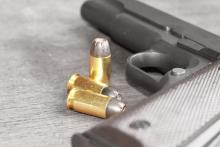
A well-known restorative justice film, "A Justice That Heals" recounts the role of faith and the church in caring for the families of both a murderer and his victim. The film climaxes in the mother’s act of forgiveness and counsel to the young man who killed her son. The power of that image of repentance, reconciliation, and restoration almost obscures another dimension of the grieving family's response to the death of their son. The victim's father resigns his job and becomes the director of an advocacy group for gun control.
The late Carl Dudley demonstrated in his research on mobilizing congregations that communities of faith rally to advocacy only after they have generated sufficient energy about and engagement with those affected by the policy. Congregations care about people not policy, stories over statistics, and narratives before numbers. Even the civil rights movement found its genesis in the story of Rosa Parks, and others like her, rather than in the "ethics" of segregation and discrimination. So, like the family in "A Justice That Heals," our work to mobilize around gun control requires creating a climate where people's experience with those who are victimized by bad policy.

Military medals have historically been given for exceptional bravery in combat. But the Defense Department has announced a new medal – for flying a drone. A servicemember can now sit at a screen in the United States with a joystick and earn a “Distinguished Warfare Medal.” Army Times reports,
“The Pentagon is creating a new high-level military medal that will recognize drone pilots and, in a controversial twist, giving it added clout by placing it above some traditional combat valor medals in the military’s 'order of precedence.'
“The Distinguished Warfare Medal will be awarded to pilots of unmanned aircraft, offensive cyber war experts or others who are directly involved in combat operations but who are not physically in theater and facing the physical risks that warfare historically entails.”

As the drone debate continues, the Senate Intelligence Committee is delaying a confirmation vote on John Brennan as CIA Director. Brennan most recently was President Obama’s counter-terrorism advisor, and in that capacity the administration’s point person on drones. The Washington Post reports:
“A Senate confirmation vote on John O. Brennan as CIA director has been postponed for at least two weeks as lawmakers step up pressure on the Obama administration to provide more information about its drone campaign against terrorism suspects.
“In particular, Senate Intelligence Committee Chairman Dianne Feinstein (D-Calif.) said Wednesday that she is seeking seven Justice Department memos related to the administration’s targeted killing program, in addition to four the committee has been allowed to view.”
Like former Sen. Chuck Hagel, Richard Lugar is a moderate-to-conservative Midwest Republican. Lugar was defeated in a primary election last year by a tea party candidate, and this week gave his first public speech since leaving office in January. According to the Ft. Wayne Journal Gazette, he spoke of the out of control partisanship that now controls Washington politics, specifically noting the “politicization of national security policy” in the debate over Hagel’s nomination as Secretary of Defense.
“Hagel’s “main transgression is that he is a Republican who has questioned policies that are sacred among most conservative senators,” Lugar said. “These include whether the surge in Iraq was worth the lives lost, whether the current high levels of defense expenditures make strategic sense, whether nuclear forces can be reduced further and whether there are non-military options in dealing with Iran.”

What do we do? How do we stop this?
“Motorists and walkers scattered in terror Monday night as a gunman fired two bursts of bullets at passing vehicles near an Oakdale grocery store, killing a 10-year-old boy and wounding two other people. Click HERE for the Star-Tribune story.
We can‘t stop it. America is an arsenal with an open door. And any attempt to close the door is “unconstitutional.” Liberty, one of three basic rights outlined by The Declaration of Independence, is killing the other two. “Liberty” trumps not only “the pursuit of happiness” but “life” itself.
“At least two vehicles struck by bullets sped into the parking lot of the nearby Rainbow Foods at 7053 10th St. N. seeking help.”
Responsible gun owners did not do this. An irresponsible gun owner did this. But it would have made not one ounce of difference if the passersby had been armed. They were sitting ducks, like the ducks in a carnival booth. There is no protection against irresponsible use of a firearm.

An extended interview with addiction-recovery worker Jim Balmer

This pledge, which draws on one used by Mahatma Gandhi's independence campaign in India, was used in the U.S. civil rights movement in the 1950s and '60s.
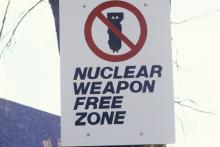
HOW MANY NUCLEAR weapons make us "safe"?
At the height of the Cold War, both the U.S. and the Soviet Union had tens of thousands of nuclear warheads, aimed at each other's cities, towns, and military targets. Not many felt that the world was somehow made safe by this hair-trigger, apocalypse-risking standoff.
The Soviet Union is long gone, but the Cold War mentality that fueled the era's nuclear arms race seems to linger on. According to a December report by the Federation of American Scientists, the world's combined stockpile of nuclear warheads is still more than 17,000. Of these, the report continues, "some 4,300 warheads are considered operational, of which about 1,800 U.S. and Russian warheads are on high alert, ready for use on short notice."
President Obama, for his part, has laid out what he called his "vision of a world without nuclear weapons." In a speech last March in Seoul, South Korea, Obama said the goal of a nuclear-free world "would not be reached quickly, perhaps not in my lifetime," but that it must begin "with concrete steps." He continued, the "massive nuclear arsenal we inherited from the Cold War is poorly suited for today's threats," and "we can already say with confidence that we have more nuclear weapons than we need." (That could be considered a gross understatement, since the next leading nuclear threat—China—has only about 50 warheads on ICBMs that could reach the U.S.)
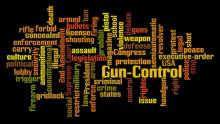
Red, white, and blue. Pick-up trucks. Apple pie. Baseball. Church on Sunday. And guns. You can't get much more American than that, or so it seems here in Montana. This week a regional newspaper posted on Facebook looking to find proponents of greater gun restrictions for an article they were writing. Within minutes the request was laughed at, belittled, and deemed unlikely. Truth is, even if someone did lean toward greater gun control, they never would have publicly responded. To utter such absurdities is equivalent to branding yourself anti-freedom, anti-American, and even anti-Christian. To listen to the rhetoric, gun control of any kind is nothing more than an eager embrace of Nazi-fascism, Chinese-communism, and the demise of all things American. And surely God would disapprove.
Which makes me wonder: what would God say about gun control? Not in some sort of glib WWJD-type platitude, nor in an entangled concoction of American freedom and Christian theology. And definitely not in a sensationalized proof-texting approach to scripture. But honestly, can our faith inform this conversation? And should it?

The day after the hearing on John Brennan’s nomination to head the CIA, U.S. drones were back in action over Pakistan. An attack on Friday in the border tribal region killed seven suspected militants. NBC News reports:
“Seven people were killed and six others injured in a U.S. drone attack in Pakistan's South Waziristan tribal region on Friday evening, Pakistani security officials said. The officials and tribal sources said the drone fired six missiles and pounded two separate mud-built houses in the Babar area of the Ladha subdivision in the South Waziristan tribal region.”
Other reports with different details nclude DAWN, Al Jazeera, and the Associated Press.

America’s killing by drone program finally became frontpage news this week with the leak of a memo arguing the legality of targeting U.S. citizens suspected of being al Qaeda leaders. But the debate remains too small. Whether the president has the legal authority to order the killing of U.S. citizens is certainly an important question, but there are more fundamental issues not being given as much scrutiny. Some were touched on in the confirmation hearing of John Brennan, but much remains unanswered.
Beginning under President George W. Bush, and escalating under President Barack Obama, the United States is currently using armed drones in four countries (Afghanistan, Pakistan, Yemen, and Somalia), has used them in two others (Iraq and Libya), and is considering using them in northern Africa. Why should we oppose this means of warfare?
Perhaps the most important reason is this. For those of us who follow Jesus, the Prince of Peace, killing other people, whoever they are, by whatever means, violates his teachings. An endless cycle of violence is not the solution to our world’s problems; we should rather actively seek peace. We cannot expect nations to live by the ethic of Jesus, as John Howard Yoder reminded us. We can, however, expect them to live by law, the standards they have set to restrain the worst of violence. From that perspective, here are some reasons for opposing drone attacks.

The publication on Monday of a previously secret Justice Department memo attempting to legally justify the killing of American citizens has opened the door for front-page questions about the entire drone program.

Editor's Note: DRONE WATCH follows daily developments about drone strikes and policy concerning the highly controversial usage of drones. To keep up to date, follow our Quick Read blog HERE.
One of the most hotly contested points of the administration’s drone policy is its claim to have legal justification for killing U.S. citizens. Now we have their rationale for that claim. Michael Isikoff, National Investigative Correspondent for NBC News, published on Monday a memo he says was given to members of the Senate Intelligence and Judiciary committees in June.
The “Department of Justice White Paper” outlines certain conditions for an attack. An “informed, high-level official of the U.S. government” must determine that the targeted U.S. citizen is a “senior, operational leader of al-Qa’ida or an associated force,” poses “an imminent threat of violent attack against the United States,” “capture is infeasible,” and the attack is conducted in a way consistent with “law of war principles.” In those conditions, the memo says, “a targeted killing of a U.S. citizen who has joined al-Qa’ida or its associated forces would be lawful under U.S. and international law.”
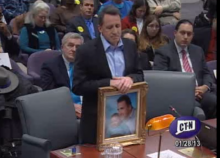
We know we are addicted to something when that behavior damages our relationships with people. When alcohol, drugs, food, gambling, or work is more important than mother, father, husband, wife, child, friend, or neighbor, we know we have a problem. Similarly, we know that we are worshipping an idol when a created thing becomes more important than the Creator, when we put our faith in our fears and a dead thing that cannot love us back becomes the object of our ultimate concern. We know we are worshipping an idol when our devotion fails to cause us to love and to respect our neighbor.
In a Connecticut hearing about gun violence, Neil Heslin — a father whose son died in the mass shooting at the Sandy Hook Elementary School —asked why any one individual citizen needs military-style assault weapons and high-capacity magazines. People in the room answered by quoting the Second Amendment. In this case, the Second Amendment was more important than this father’s pain. Their lack of respect for his pain indicated a deficit of both compassion and love, not only for this grieving father but for a grieving nation.
Let us be clear. The Second Amendment is not holy writ, and a gun is not God. Far too many Americans have made these created things, these inanimate objects more important than the compassion we ought to have for one another. This is fetishism. This is idolatry. This is morally wrong.
The Senate Judiciary Committee held its first hearing on gun control in the new Congress this morning. The first witness was former Rep. Gabrielle Giffords, D-Ariz., who survived being shot in the head two years ago.
Here, via CBS News, is her statement.
"Thank you for inviting me here today. This is an important conversation for our children, for our communities, for Democrats, and Republicans.
"Speaking is difficult but I need to say something important.
"Violence is a big problem. Too many children are dying — too many children. We must do something.
"It will be hard. But the time is now. You must act. Be bold. Be Courageous. Americans are counting on you. Thank you."
Other witnesses included Gifford’s husband Mark Kelly, James Johnson, chief of police for Baltimore County, Md., and chairman of the National Law Enforcement Partnership to Prevent Gun Violence, and Wayne LaPierre, CEO and Executive Vice President of the NRA.
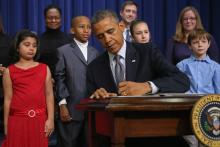
When I was a little girl, my mother and I prayed together every night:
Now I lay me down to sleep.
I pray the Lord my soul to keep.
If I should die before I wake,
I pray the Lord my soul to take.
And then I would ask God to bless a list of people who were on my mind.
Every night I spoke about my own death, but death was not real. It never occurred to me that I would die or that my parents would die.
One day when I was in the fifth grade, we heard gun shots outside our school. Our teachers did not let us go outside for recess that day because a woman had been killed, caught in the crossfire of a domestic dispute between her son and his wife. By the time school was out, the body had been removed; there was no yellow crime scene tape. There was still blood on the ground to mark the spot of this tragic death. The next day it would be washed away.
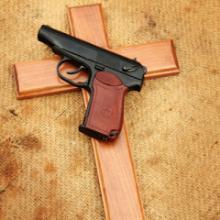
The Arkansas Senate has passed a bill that lifts a ban on carrying concealed weapons in church.
The proposal, which goes to the Arkansas House for consideration, would allow churches to decide which, if any, worshippers with concealed carry permits can bring their firearms inside.
The measure passed 28-4 on Monday Jan. 28, KATV reported.